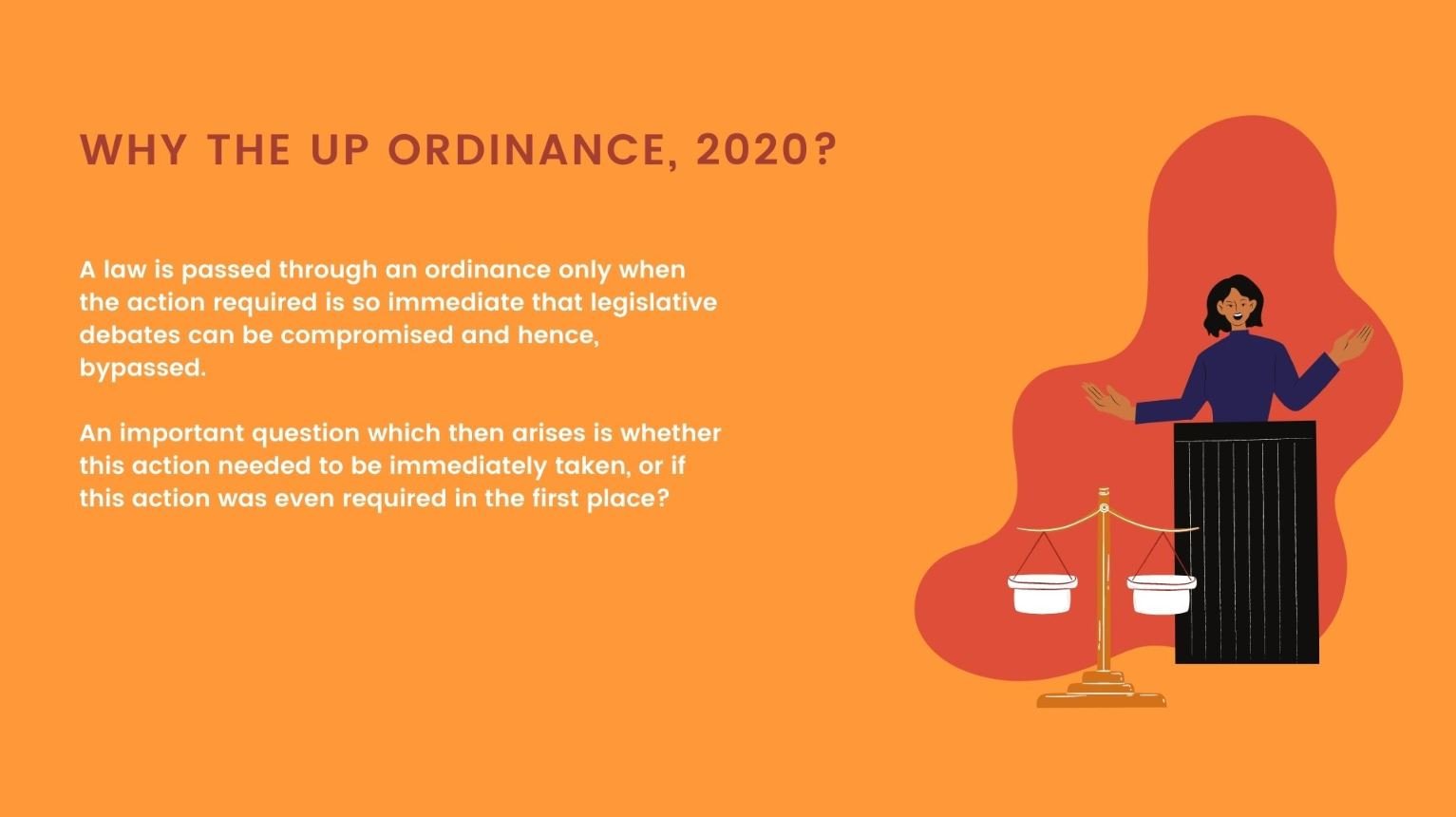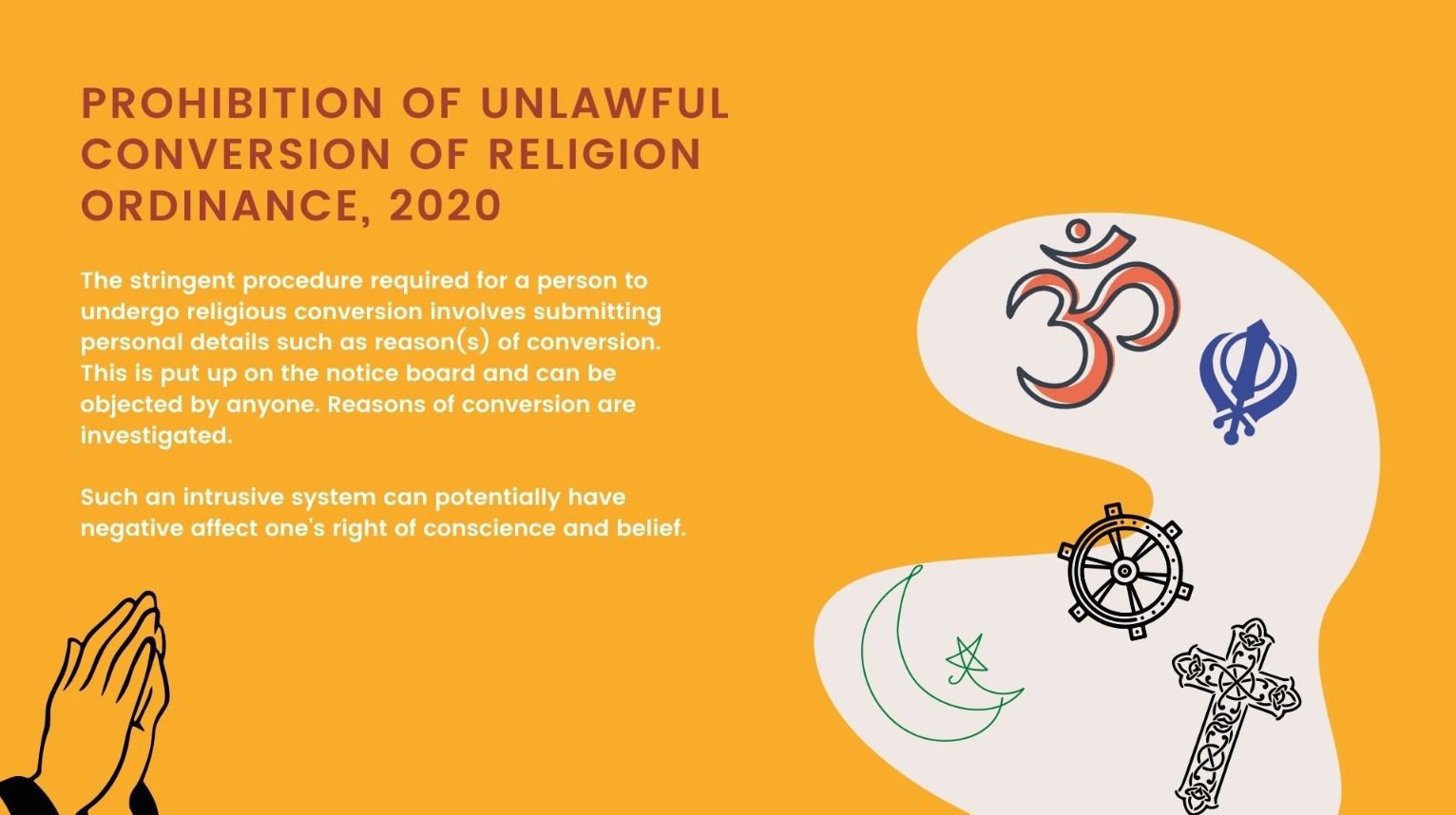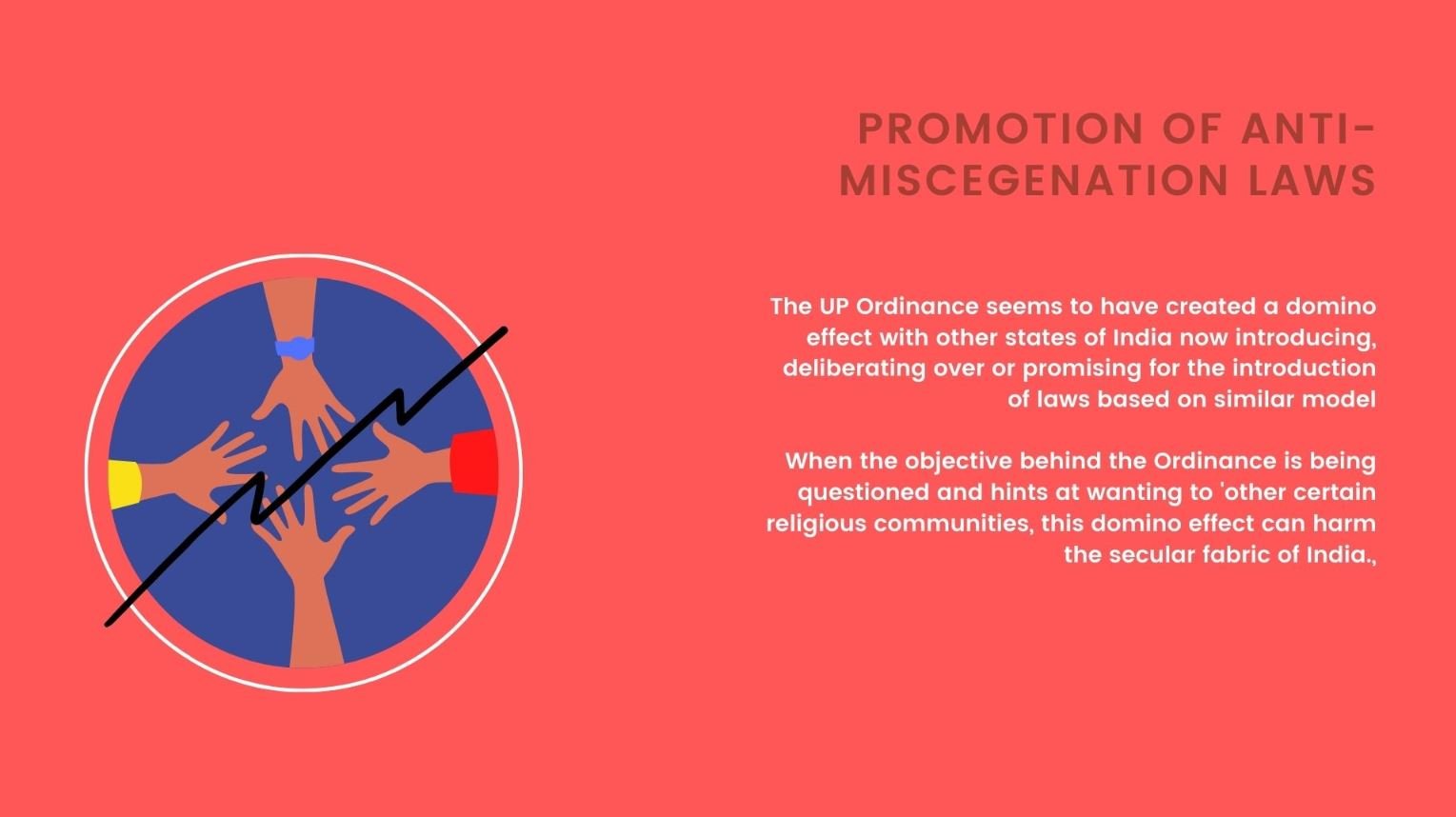The infamous Prohibition of Unlawful Conversion of Religion Ordinance, 2020, being popularly referred to as the Love Jihad law, was promulgated by the Uttar Pradesh government on 27th November 2020. The arbitrarily wide UP Ordinance, which lays down intrusive anti-conversion laws with special emphasis on invalidating conversions done for the purpose of marriage, has been under criticism from even before its enforcement for curtailing more than one fundamental right. What makes this anti-conversion law different from the ones implemented in other states of the nation is the intention behind it, its vague provisions, lack of necessity and proportionality, and the risk of creating an anti-miscegenation culture.
Why the UP Ordinance?

Legislative Intent
It is a well-settled principle in law that a statute cannot be read in isolation; it should be read with context to more fully understand the object and purpose behind it. Therefore, when an anti-conversion ordinance of such type is promulgated by a state government with a record of being anti-interfaith marriages, right after a speech charged with hatred against a minority community, scrutiny is rightly accompanied.
Although the UP Ordinance does not mention the term ‘Love Jihad’ or name any specific religious community, it can be reasonable inferred from the context that this law aims to ‘protect’ Hindu women from men of minority religions, especially Islam, from charming them and thereafter marrying them for the sole purpose of conversion. In fact, after a month of the law coming into effect, 14 cases were registered, most of which have been filed by the relatives of Hindu women alleging that the accused were pressuring them to convert to Islam. In most of the cases, the couples claimed to be friends or in a consenting relationship involving adults.
The foul legislative intent is also reflected through section 12 of the UP ordinance. It goes against the general principle followed in criminal law which places the burden on the prosecution and treats the accused as innocent until proven guilty. Section 12 shifts the burden of proof to the accused to prove that the wedlock entered into by the two parties is not forced. This makes it easier for disapproving relatives to slap charges against the interfaith couple. Coupled with social stigma, it results as an additional deterrent for interfaith couples.
Question on Requirement and Urgency of the Ordinance
A law is passed through an ordinance only when the action required is so immediate that legislative debates can be compromised and hence, bypassed. An important question which then arises is whether this action needed to be immediately taken, or if this action was even required in the first place?
There is no legal evidence to back the conspiracy of Love Jihad. The Centre itself told that there is no such thing as ‘love jihad’ in the existing Indian laws. Investigations by the National Investigation Agency have turned up no evidence regarding cases for the same. Similar results have been found by a range of police forces across various states in their investigations. The National Commission for Women replied to a right-to-information query saying that it did not maintain data on love jihad cases. The Kerala High Court too has criticised the practice of sensationalising interreligious marriages as love jihad.
Apart from the legal non-existence of the practice, the other problem is that there are already other legislations and precedents against forceful marriages which can be resorted to. There was no immediate requirement for the UP ordinance to have bypassed the discussion in the assemblies. One of the many such provisions is section 366 of the Indian Penal Code that punishes the offender for kidnapping, abducting or inducing woman to compel her marriage, etc.
Does it meet the criteria of Proportionality?
The right to religion and conscience prescribed in Article 25(1) of the Constitution comes with exceptions and can be curtained reasonably for maintaining public order. This was reiterated by the Madhya Pradesh High Court which upheld the state legislation on anti-conversion law to be valid for maintaining public order. Further, in the landmark judgment of Rev Stanislaus v. Madhya Pradesh 1977 SCR (2) 611, wherein the Apex Court looked at the constitutional validity of two anti-conversion legislations in Orissa and Madhya Pradesh, it backed the Madhya Pradesh High Court’s interpretation of the anti-conversion law.
However, the UP ordinance is not the same as the anti-conversion laws in other states. In Rev Stanislaus v. State of Madhya Pradesh, the category of ‘conversion by marriage’ did not exist. Further, the conversion process wasn’t as twisted, vague, stringent and nor did it violate as many fundamental rights of the individuals who wished to undergo conversion.
Moreover, the punitive measures allow for the detainment of the accused without a warrant for a number of days, at the court’s discretion. Section 7 makes the offence of illegal or forced conversion a cognisable and non-bailable offence. While the UP Police has registered 14 cases within a month of the law coming into force, 51 have been arrested, out of whom 49 remain in jail.
Infringement of Fundamental Rights
UP’s new ordinance interferes with numerous fundamental rights, such as the right to choice of life-partner, right to dignity, right to privacy and freedom of religion. It forces couples to go through an intrusive and rigorous procedure to go through something as personal as marriage. In Shafin Jahan v. Asokan KM (2018) 16 SCC 368, the Apex Court had said that interference by the State in such matters has a serious chilling effect on the exercise of freedoms.
The right to choose a life-partner and the right to dignity have been held to be implicit in Article 21 of the Constitution through judicial interpretation. The Allahabad High Court had passed an important judgement in the same month in which the ordinance was passed. In Salamat Ansari and Ors vs State of Uttar Pradesh and Ors, a Division Bench held that the right to live with a person of choice irrespective of religion professed by them, is intrinsic to right to life and personal liberty, and that interference in a personal relationship, would constitute a serious encroachment into the right to freedom of choice of the two individuals.
The Court has repeatedly held that where the two individuals having attained the age of majority, are living together, nobody is entitled to interfere in their peaceful life, and have also granted protection to inter-faith couples. The Karnataka and Delhi High Courts too have upheld the right to marry the person of choice irrespective of their religion or caste.
One may argue that interfaith couples can marry under the secular Special Marriage Act, 1954 without converting. However, the reason that a couple might consider converting is the social stigma attached to such marriages, and to avoid the problematic 30-day notice period required to get married under that Act. This was also found in a 2018 paper by the Law Commission.
The SMA requires a marrying couple to give a 30-day notice wherein the details of the couple are posted publicly and the marriage can be objected to within those 30 days. While dealing with the matter, the Allahabad High Court recently held that the requirement of notice and inviting objections of intended marriage under sections 6 and 7 violates the right to privacy and hence, is not mandatory. This SMA provision is presently under challenge in the Supreme Court as well.
This notice-period has been doubled under section 8 of the UP ordinance for those who wish to convert. For whose intending to convert, a 60-day notice is to be given to a district magistrate, declaring they are converting of their own accord. The person performing the conversion must also give a month’s notice to the magistrate. Further, the reasons for conversion are investigated and can be objected by anyone (due to lack of clarity in the law) during the notice period.
The Himachal Pradesh High Court, while dealing with the requirement of similar notice to the district magistrate, had noted that a person not only has a right of conscience, the right of belief, the right to change his belief, but also has the right to keep his beliefs secret. A person’s belief or religion is something very personal to him and the State has no right to ask a person to disclose what is his personal belief.

The notice under section 8 requires those intending to convert to provide intrusive details such as names of parents, address, occupation, monthly income, marital status, caste and even the names of their dependents. The intended date of conversion, place of conversion and name and address of the priest conducting the conversion needs to be also be provided. The details, required for investigation in the matter of conversion, are open for everyone to see. This is a serious infringement of the right to privacy, which was held to be an integral part of Article 21 in the K.S Puttuswamy judgement. The threat to privacy and consequent violence creates a serious detriment for couples wishing to convert.
Promotion of Anti-Miscegenation Laws
After UP, other states like Haryana, Karnataka, Assam are planning to come up with similar anti-Love Jihad laws to criminalise religious conversions through marriage. In January 2021, the Madhya Pradesh’s governor promulgated the Madhya Pradesh Freedom of Religion Ordinance, 2020, under which cases have started being filed already. In Kerala, promises have been made to bring a similar law if NDA is voted to power. This domino effect can prove to be harmful, especially for a nation like India which has secularism embedded in its fabric.
These laws resemble the Nazi Nuremberg Laws in ideology. The ‘Reich Citizenship Law’, and the ‘Law for the Protection of German Blood and German Honor’ passed by the Nazis in 1935 aimed at maintaining racial purity of the German Volk. The latter of the two laws principally resembles the UP ordinance in question. It prohibited marriage between Jews and those of ‘German blood’.
A majority of states in the USA too had such laws with the aim of preventing marriage between Whites and African-Americans long before Nazi Germany. While such laws have been repealed over the decades in other nations, we are heading in the backward direction, with the risk of reversing the little cultural tolerance we had achieved through years of attempt.

The degree of punishment in the UP ordinance might not be half as severe as the Nazi laws, however, the specifics of these laws are not really relevant, what is relevant is the object they seek to achieve. The objective behind these laws is to ‘other’ oppressed communities and classify them as lesser, by forwarding the narrative that they are want to contaminate the majority culture.
Such laws formalise and solidify the harmful social classification and cause national unrest in countries which are heterogeneous and diverse, by provoking apprehensions and agitation regarding several minority cultures. If laws are used as weapons for promoting communal hate, there will be very less left to ensure ‘public order’ in society.
Recent Developments
The UP ordinance was challenged before the Allahabad High Court, contending that it is violative of various fundamental rights including the right to equality, right to life and freedom of conscience and free profession, practice and propagation. In this regard, the High Court had issued notices to the UP government. However, the UP government filed a transfer plea before the Supreme Court under Article 139A, seeking the transfer of petitions from the Allahabad High Court to the Apex Court itself. This was refused by the Court on 25th January, 2021.
Apart from this, petitions were earlier filed before the Apex Court challenging the UP ordinance and a similar law enacted in Uttarakhand. On 6th January, 2021, the Supreme Court agreed to examine the constitutional validity of these laws, but refused to pass a stay order on them.
This article has been written by:

To connect with Khushi on LinkedIn, click here

